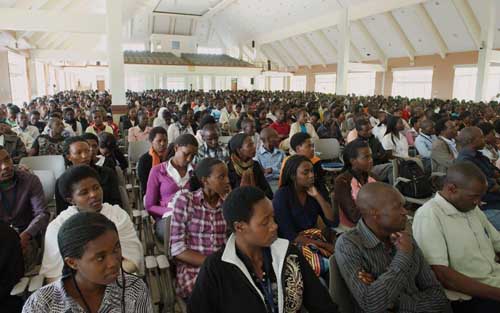
BY CLAUDE RICHLI
Rwanda is rapidly becoming a model for all Africa. In a
continent that has been so deeply scarred by tribalism and whose development has
been significantly impeded by corruption, the progress of Rwanda throughout the
last 10 years has been nothing short of spectacular. Because of its tragic
past, the Rwanda government has put great emphasis on implementing policies
that are inclusive of both Hutus and Tutsis. These policy implementations began
at the top of the government structure, and are now making their way down and
becoming visible at lower levels. Not only does the government guarantee equal
opportunities regardless of ethnic background, but it also has made significant
strides in promoting women. Almost two thirds of the members of parliament are
now women, which places it in first position in the world in that respect.
1
As for corruption, according to Transparency
International, Rwanda is the third least-corrupt country in Africa behind
Botswana and Cape Verde, well ahead of Italy and other European democracies.
2 No longer do people need to fear being stopped arbitrarily while driving for a
bribe by a police officer. When residents see police officers on the streets, they
now assume they are there to enforce traffic laws, not to line their pockets.
As a result, at traffic stops and red lights, motorists are mindful of
pedestrians and speed limits.

In other areas, Rwanda is promoting values that
Seventh-day Adventists have been advocating for more than a century. For
instance, smoking is discouraged everywhere. The country has one of the lowest
smoking rates in the world, thanks to, among other things, high consumption
taxes. The consumption of alcohol is also discouraged. According to Hesron
Byilingiro, president of the Seventh-day Adventist Church in Rwanda, you can’t
expect to be promoted as a government official if you have a reputation for
enjoying alcohol. In fact, you can even lose your job. Bars remain closed
during the day to curb consumption, and even at wedding parties no alcohol is usually
served.
One of the biggest factors being utilized to create
national unity and to rebuild the country has been “umuganda.” The word “umuganda”
means “to give something,” “to help.” It is a program of compulsory community
work that takes place on the last Saturday morning of the month, when every
citizen of the country between the ages of 18 and 55 is required to donate
labor and time to do community service. They build social housing and schools,
plant trees and shrubberies, pick up trash, and improve communal roads. There
is no distinction between men and women as to the type of work they do.
Everybody pitches in. Between 8:00 and 11:00 on those Saturday mornings there
is no traffic in the country, except for emergency vehicles and Seventh-day
Adventists, who receive a special dispensation to go to church and then provide
community service on Sunday mornings instead. This is strictly enforced by
police agents, who stop Adventists on their way to church and demand to see
their membership card, as well as by a system of neighborhood citizen controls that
follow up on those who are sick or shut in, and by a system of booklets that get
stamped every month at the end of community service. These booklets have to be
produced in order to get social services from the government. Those who skip mandatory
service are fined.
This, of course, is not the first time a country or a
society has introduced mandatory community service. But in the aftermath of the
genocide, this system has contributed greatly to rebuilding a sense of
community, discipline, common purpose, and national pride. As a result, the
country is now spotless. You can drive anywhere and not see a single plastic
bag lying around, let alone other forms of trash. Small towns have public
spaces beautified with potted plants and trees. Dirt roads are leveled; paved
roads are free of potholes, which are prevalent in other regions of Africa;
fields and forests are carefully tended. Indeed, the country is at work, and
its citizens have set themselves high standards.
On my way to Gisenyi from Kigali, a distance of about 150
kilometers (90 miles), I noticed that not only was the country well-tended and
the road free of potholes, but every 150 feet or so stood a tall pole made of
quality concrete. I asked President Byiliingiro if they were about to install Internet
lines. His answer was: “No, these are going to be light poles. The whole road
is going to be lit across the entire country.” I was astonished. He then added:
“This is our philosophy: since Rwanda is a small country, let’s make it into a
model for Africa, just like Singapore is for Asia.”